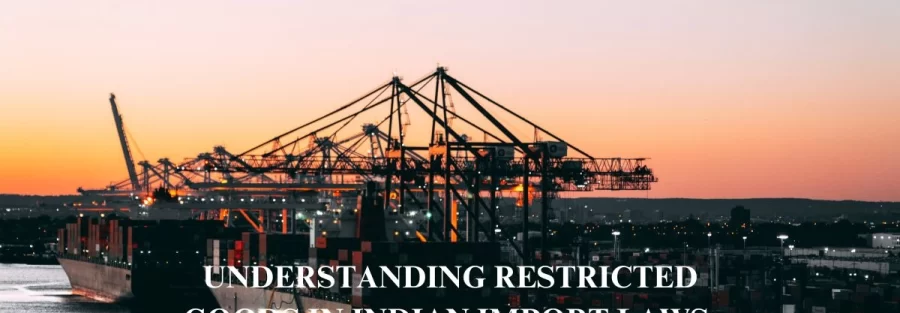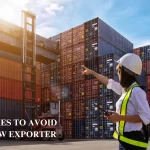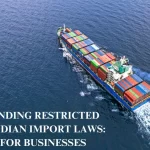India is one of the fastest-growing economies in the world. There are a variety of imports and exports, from electronic devices to agricultural products; countries are involved in dynamic trading and world-class partners.
But within the lively business framework, there is a complex problem of these limited products in accordance with strict rules to protect the interests of the nation, health, and the environment.
It is important for businesses that are determined to grow in international business to understand these limitations.
These blogs have a summary of the ban, the crispy frame, and methods of ensuring that the regulations are being followed while using them.
Benefits from the ban on business opportunities that are banned and how the business can guarantee the following.
Restricted Goods in Indian Trade: Definitions and Classifications
A. What is the Prohibited List?
Restricted goods refer to goods that cannot be freely imported or exported without specific permission or license from the regulatory authority. They are completely prohibited. But they may be subject to rigorous scrutiny to ensure they comply with national policy.
B. Categories of Restricted Items
Hazardous Materials: Items such as chemicals, explosives, and radioactive materials require strict control to prevent misuse and safety.
Agricultural Products: Some seeds and foods may be banned due to biosafety concerns.
Technology and Electronics: Advanced technology with potential military applications often falls into this category.
Wild Animals and Animal Products: Strict regulations govern trade in these goods to prevent illegal trade and protect endangered species.
More detailed can be found on DGFT restricted import goods lists.
C. The Legal Framework Governing Restricted Items
Indian import laws are determined by acts and policies such as the Foreign Trade Act. (Development Regulations), 1992, Customs Act, 1962. These laws outline the licensing, documents and procedures businesses must follow when dealing with restricted goods.
Navigating the Regulatory Maze: Authorities and Compliance
A. Important Supervision Agencies
- The Foreign Trade Committee (DGFT): Overseeing licenses and licenses for limited products
- Customs Department: Enforcing import and export rules at the port and exit
- Pollution Control Committee: Make sure that the environment is protected for products such as dangerous chemicals.
B. The Requirements for Importers
- To import the product legally to India, the business must:
- Get a license or rights that are needed by DGFT.
- Follow the label and packaging requirements in accordance with Indian standards.
- Submit the document in detail, including bills, certificates, invoices, and regulations in accordance with the rules.
C. The Consequences of Compliance
It may fail to comply with import rules:
- Heavy Penalties and Fines
- Seizures by customs officers
- Legal actions, including the prohibition of imports in the future
Economic and Trade Impacts of Restricted Goods
A. Global trade relations and influence
Import restrictions may affect international trade relations. Even though they protect the domestic industry, it can also cause conflict with trading partners. For example, restricting the import of certain goods from a country could strain diplomatic relations.
B. Economic Impact on Businesses and Consumers
- For Businesses: Compliance costs may increase due to extensive licensing and documentation requirements; however, they also encourage ethical behavior and innovation.
- For Consumers: Prohibited products may limit the availability of certain products. Affects consumer choice and may increase the price
C. Real-World Examples
Ban on imports of certain agricultural products during the COVID-19 outbreak. Help protect local farmers. But it also affects the international supply chain.
Restrictions on the import of hazardous waste strengthen environmental protection. But it affects businesses that rely on recycled materials.
How Curated Exim Consultants Simplifies Compliance
A. Customized Solutions for Documents
From creating the right documents to managing submissions. The Curated Exim team streamlines all processes, reducing errors and ensuring compliance.
B. Consulting Services to Reduce Risk
With in-depth knowledge of import laws, Curated Exim helps businesses identify risks and implement best practices to avoid penalties.
C. Training and Support
To empower your business, Curated Exim provides carefully curated training sessions and resources. This ensures that the team stays up to date on the latest regulations and compliance requirements.
Conclusion
In the ever-changing world of international trade, understanding and complying with import restrictions is not just a legal obligation. But it is also a strategic imperative. Banned goods play an important role in protecting national interests. Promote sustainability and promote ethical trade practices.
By partnering with an experienced consultant like Curated Exim, businesses can confidently navigate this complex terrain. Ensure compliance and success in India’s vibrant import and export ecosystem.
Take the first step towards informed and compliant business practices; choose a Curated Exim consultant for expert advice.




